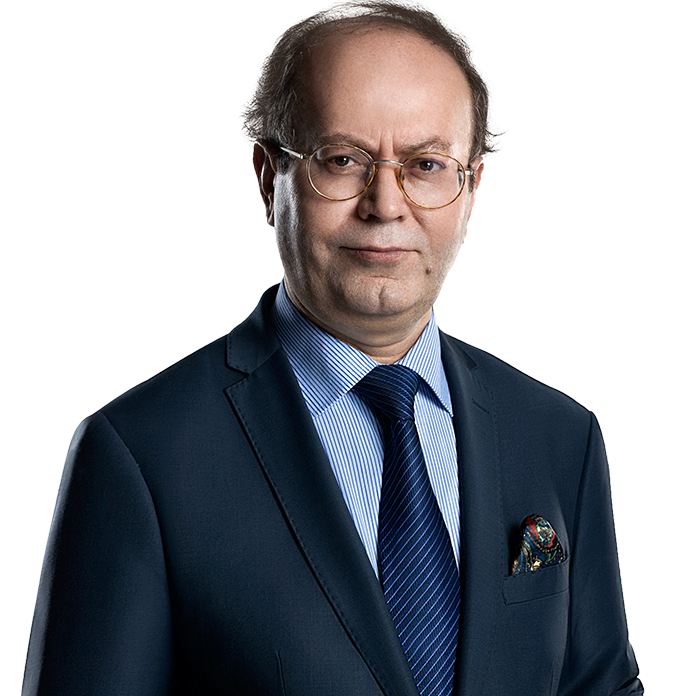Our Pakistan flight departed almost two hours late.
While at the airport, we fell into deep conversation with the adviser to Pakistan’s Istanbul consul general, Waqar Badshah, who is originally from Bukhara. Badshah did his doctorate in Türkiye, and besides serving as adviser to the consul general, he currently works at Ibn Haldun University.
I became very fond of Badshah. He is not only very hardworking but also a very talented, beautiful person, who has the skills to communicate in a language and tone that will win everyone’s heart. We have such a great need in this off-the-rails world for such beautiful people, who are talented, enthusiastic, and can win hearts with their eyes!
We can overcome and carry to brand new horizons the Islamic world’s artificial borders through trailblazers like Badshah.
Badshah was the one who both organized our Pakistan trip and hosted us.
TİKA REVOLUTION, HORIZONS
We were greeted at Islamabad Airport by Turkish Cooperation and Coordination Agency Pakistan Coordinator Muhsin Balcı. Balcı is a refined individual, who has been with TİKA ever since the start.
TİKA is the biggest supporter of this symposium on Türkiye-Pakistan relations.
TİKA made a great revolution in the last two decades, especially through Serdar Çam’s major and inspiring projects, and great ventures. It paved the way for the country and spread our civilization background and spirit across the world. It became Türkiye's civilization horizon and hope. It laid the building blocks that will make it possible to realize this hope and horizon.
I saw hints of this horizon and background in Balcı.
We came to Pakistan for the last of the annual international symposiums organized by the Ankara Thought and Research Center (ADAM), founded by former Sabahattin Zaim University rector Mehmet Bulut, and has branches all over Türkiye. TİKA’s support played a significant role in the symposium being carried out without failures from the very start.
While Bulut served as rector, he laid the structural and academic foundations that would make Sabahattin Zaim one of the country’s brightest social sciences universities. What drove him to make these efforts is the fact that he is a caring, refined, founding, and leading academic, who had an idea to establish an academy, and was concerned about developing a higher education institute in accordance with our civilization background.
MEETING WITH IMRAN KHAN
Here, in my first Pakistan article, I will be sharing a meeting that was a surprise for us as well: our meeting with former Pakistan Prime Minister Imran Khan, which ran for more than an hour.
We were able to enter the site to meet with Khan only after three security scans. We were greeted by Khan’s nephew Hasan Khan. Our phones were taken in the last security scan.
This is natural in terms of security. To be honest, though we frowned at the time, we did not find it strange.
I knew Khan from London, back when he was a symbolic cricket player. He was not very sensitive about Islam back then.
However, he made a transformation in 1996, an extremely painful incident he experienced in his family led him to embrace the Islamic lifestyle and worldview. We saw during our meeting as well that his Islamic sensitivities are high.
Such that, Khan recalled that humanity’s future is in danger, and emphasized Islam’s strong, reviving, spiritual values, and family will save humanity from the verge of perishing.
His remark that the hijab plays a very permanent role in protecting both spirituality and the family struck our attention.
One of the strongest signs showing his high Islamic sensitivity is the firm steps he has taken to open institutions that would guide youth to the practices of Prophet Muhammad.
Khan underlined a few critical problems that exist in the Islamic world.
He said that one of the most important problems in the Islamic world is the lack of law superiority. Providing detailed and striking examples from the Ottomans and Indian history, he explained with excitement that we had no such problem in the history of Islamic civilization.
Second, he stated that the world needs a leading country and a pioneering leader, who would pave the way for the Islamic world, and that this leading country is Türkiye, and this leader is the brave and pioneering President Recep Tayyip Erdoğan.
Drawing attention to the West’s operations to secularize the Islamic world as the most critical danger awaiting humanity, he said that secularization is the sole impetus threatening spirituality and the family. He added that the secularism in Türkiye is exaggerated, and absurd to the extent that it will lead to the elimination of Islam.
Perhaps the most interesting thing Khan said during our meeting was his statement that his roots are Turkish and that it goes back to a Turkic tribe called “Niyaziyye.”
It seems that economic relations with Türkiye during Khan’s term were not as developed as during Nawaz Sharif’s term in office.
Cultural, academic, and intellectual relations between Turkey and Pakistan need to be strengthened. We are not doing so well in this area. The symposium we held at the National University of Science and Technology (NUST) in Pakistan, showed us that Türkiye-Pakistan relations need to be built on strong foundations, and revealed very clearly what is necessary to strengthen these relations.




















